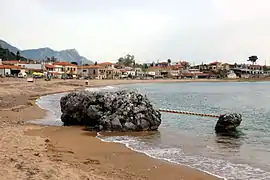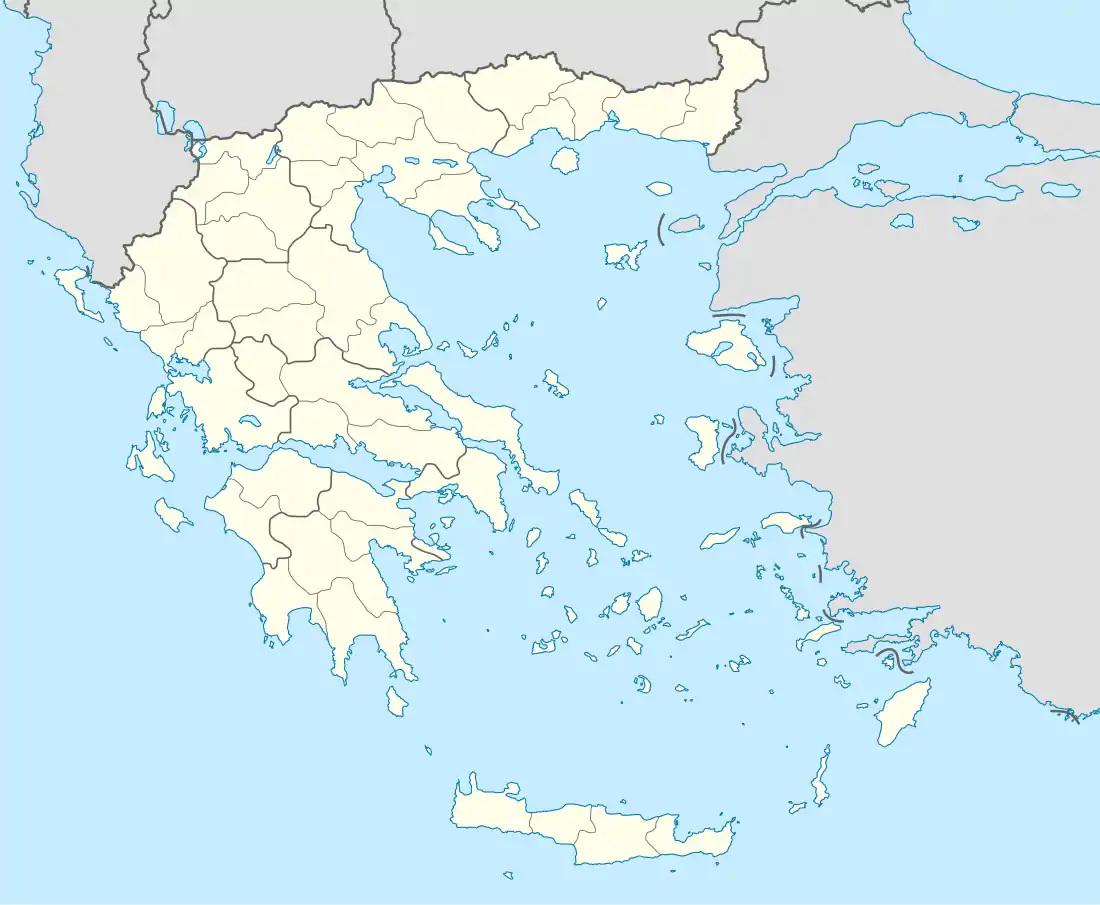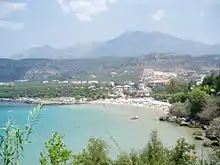Stoupa
Stoupa (Greek: Στούπα) is a village on the coast of the southern Peloponnese peninsula in Greece. It is part of the community of Neochori within the municipal unit of West Mani, in Messenia and the historic region of Mani Peninsula.
Stoupa
Στούπα | |
|---|---|
 Stoupa beach | |
 Stoupa | |
| Coordinates: 36°50.65′N 22°15.58′E | |
| Country | Greece |
| Administrative region | Peloponnese |
| Regional unit | Messenia |
| Municipality | West Mani |
| Municipal unit | Lefktro |
| Highest elevation | 46 m (151 ft) |
| Lowest elevation | 0 m (0 ft) |
| Population (2011)[1] | |
| • Rural | 628 |
| Time zone | UTC+2 (EET) |
| • Summer (DST) | UTC+3 (EEST) |
| Postal code | 24024 |
| Area code(s) | 27210 |
| Vehicle registration | KM |
| Website | www.stoupa-greece.com/en/ |
Once a sleepy little town, in the past few years more and more tourists have discovered Stoupa. There are about 20 restaurants lining the road along the beach, a few small hotels, and many rental houses. Besides Greek tourists, who come mostly in August, British and German, as well as Dutch, French and Italian tourists visit in the summer season.
Geography
Stoupa is located in an area of Greece called Outer Mani. Approximately 4 kilometres (2 mi) from Stoupa is the village of Agios Nikolaos (also known as Selinitsa meaning small moon), a working fishing village which also has a number of restaurants and guest houses but which attracts fewer tourists than Stoupa. Above Agios Nikolaos is the lovely small village called Riglia. Other places in the Mani region include Itylo (32 kilometres or 20 miles), Limeni (36 kilometres or 22 miles) and Areopoli (40 kilometres or 25 miles). Below Areopoli are the caves of Pirgos Dirou.

There are many beaches and coves around the area including Stoupa Beach, which is the most popular and has a good beginner's snorkeling site at the end of the beach. Over the hill is Kalogria Beach, with its turquoise waters and rich marine life, volleyball net, and a handful of bars and restaurants. One of the features of Kalogria beach is the upswelling of an underground freshwater spring about 100 metres (330 ft) out from the shore. It can be seen as a disturbance on the surface of the sea.
History
In the past, the Mani area was known for its fierce inhabitants, who lived in isolated fortified towers (some of which are still present today, either in ruins or having been restored). The towers offered protection in an area where feuding was commonplace.
Stoupa also has rich cultural history. It is where the Greek writer Nikos Kazantzakis travelled to with George Zorbas who Kazantzakis employed as the foreman of his lignite mine, the entrance to which can still be seen in a hillside nearby. It is their time together in Stoupa that the novel Zorba the Greek is based upon, written after hearing news of Zorba's death. There is a bust of Nikos Kazantzakis on the cliff overlooking Kalogria beach, at the corner of the main road and the beach approach. Stoupa is just 7 km away from the historic area of Kardamyli, which is mentioned in work by Homer.
Transport
There are approximately four buses a day which call through Stoupa, running from Kalamata to the southern tip of the peninsula. The bus stops by the bakery, on the main road at the top of Stoupa and takes around ten minutes to reach Agios Nikolaos.
Visitors can book coach trips to the ancient ruins of Olympia and the Corinth Canal. Another possibility is car rental, which allows travellers to take in the sights of places such as Nafplio, Mycenae, Epidavros, and Monemvasia on the Peloponnese.
The area is serviced by Kalamata Airport where charter flights to the rest of Europe are operated in the summer season, as well as scheduled summer flights to Germany, Sweden, Norway, France, Ukraine and Russia operated by Aegean Airlines.
References
- "Απογραφή Πληθυσμού - Κατοικιών 2011. ΜΟΝΙΜΟΣ Πληθυσμός" (in Greek). Hellenic Statistical Authority.